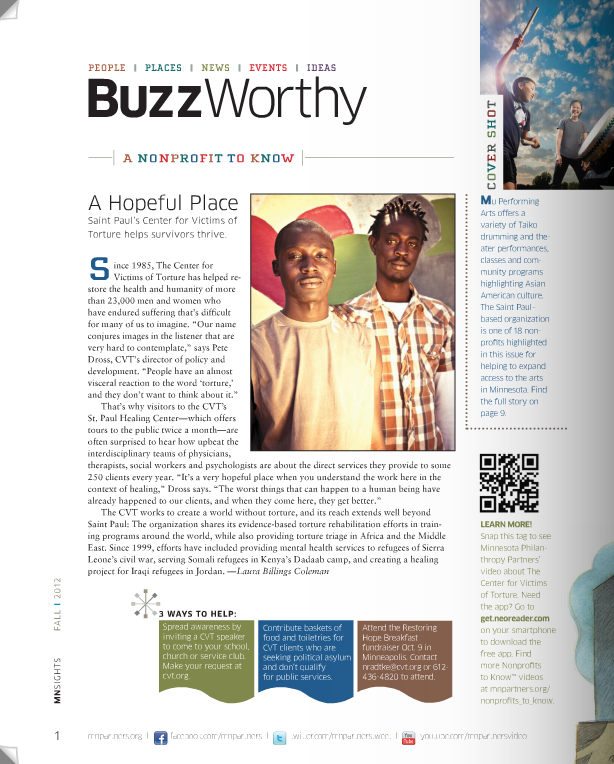a version of this story appears in MNSights, the Magazine for Minnesota Philanthropists, Fall 2012
Since 1985, The Center for Victims of Torture has restored the health and humanity of more than 23,000 men and women who have endured suffering impossible for many of us to imagine. “Even our name conjures images in the listener that are very hard to contemplate,” says Pete Dross, CVT’s director of policy and development. “People have an almost visceral reaction to the word ‘torture’ and they don’t want to think about it.”
That’s why visitors to the CVT’s St. Paul Healing Center—which offers tours to the public twice a month—are often surprised to hear how upbeat the CVT’s interdisciplinary teams of physicians, therapists, social workers, and psychologists sound about the direct service they provide every year to some 250 clients. “The very worst things that can happen to a human being have already happened to our clients, and when they come here, they get better,” Dross says. “It’s a very hopeful place when you understand the work here in the context of healing.”
The CVT shares its evidence-based torture rehabilitation efforts in training programs around the world, while also providing boots-on-the-ground torture triage to hard hit locales in Africa and the Middle East. Since 1999, efforts have included providing mental health services to refugees of Sierra Leone’s civil war, serving Somali refugees in Kenya’s teeming Dabaab complex, and providing direct aid to Iraqi refugees in Jordan, who were caught in the Sunni-Shi’a conflict or tortured by U.S. personnel.
Advocating against the use of torture (“no matter who is committing it,” says Dross) is also part of the CVT’s mission, an effort that has earned the nonprofit strong support in Washington, D.C. from Minnesota lawmakers from both sides of the aisle. “In spite of the partisan differences in this country, there’s a shared commitment to democratic values,” says Dross. “We understand torture to be an attack on democracy with a small d.”
–Laura Billings Coleman
Get involved:
1). Many CVT clients are seeking political asylum in the U.S. and don’t qualify for public services, so baskets of food, toiletries and laundry essentials are welcome contributions for the clients and their families.
2). To sign up for one of CVT’s twice a month tours, visit cvt.org. The nonprofit also provides volunteer speakers to visit area schools, churches, and service clubs to talk about the CVT’s rehabilitation and advocacy effort for torture victims.

